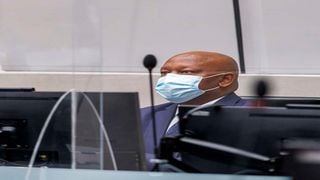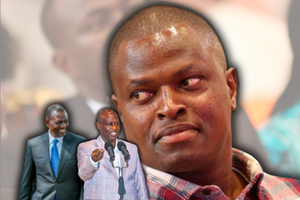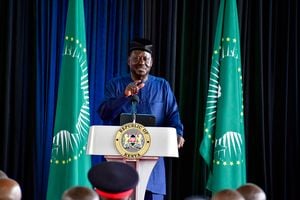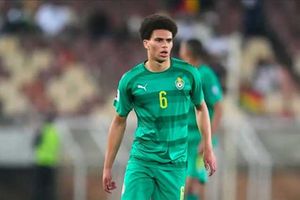
Lawyer Paul Gicheru during the opening of his case at the ICC on February 15, 2022. His defence has sought to portray the prosecution’s main witness as unreliable.
News
Premium
Impact of Gicheru case on William Ruto’s collapsed trial
What you need to know:
- Mr Gicheru, through his lawyer Michael Karnavas, has unsuccessfully protested assigning his case to a single judge.
- Mr Gicheru is accused of corruptly influencing prosecution witnesses who had been lined up to testify against Dr Ruto and Mr Sang’.
When the trial of lawyer Paul Gicheru started this week, the differences with the previous Kenyan cases at the International Criminal Court (ICC) were all too obvious.
This is despite the fact that the outcome of the Gicheru trial could have a lot to say, especially concerning the collapsed case against Deputy President William Ruto and journalist Joshua Sang’, whose trials for crimes against humanity allegedly committed during the 2007/8 post-election violence were terminated in April 2016.
Right from inside the courtroom, the Gicheru case seems to have been assigned a low profile status to the extent that at both the pre-trial phase and ongoing trial, the presidency of the ICC assigned a single judge each.
Sierra Leonean Miatta Maria Samba is the single trial judge while Judge Reine Adélaïde Sophie Alapini-Gansou from Benin was the single judge at the pre-trial phase.
In both instances, Mr Gicheru, through his lawyer Michael Karnavas, has unsuccessfully protested assigning his case to a single judge. In the previous cases at the ICC involving Kenyans, there were usually three judges.
Unlike the earlier Kenyan cases at The Hague involving President Uhuru Kenyatta and DP Ruto, the public gallery is largely empty except for Mr Gicheru’s wife and a few visitors who drop by and leave shortly after.
Influencing witnesses
The throngs of MPs who would flood The Hague to follow the cases are nowhere. At the ICC, the hearing of the appeal by Ugandan Dominic Ong’wen sometimes attracts a bigger audience than Mr Gicheru’s trial.
Mr Ongwen has appealed against his conviction for 25 years for crimes against humanity and war crimes committed in Northern Uganda.
Mr Gicheru is accused of offences against the administration of justice for allegedly corruptly influencing prosecution witnesses who had been lined up to testify against Dr Ruto and Mr Sang’.
He has denied the charges against him. “Madam President, for the record, I plead not guilty,” said Mr Gicheru as the trial started on Tuesday.
After the ICC terminated the case against Dr Ruto, he and his allies quickly declared it a “vindication” of his innocence even as the former prosecutor Fatou Bensouda said the case against Ruto had fallen apart because of “a perfect storm of witness interference and intense politicisation of the court’s legal mandate and work.”
In the opening statement, Deputy ICC Prosecutor James Stewart repeated the Bensouda lines on the impact that alleged witness tampering had in the Ruto case.
Guilty verdict
At the end of the Gicheru trial, one person between the DP and Ms Bensouda will be proven right. A guilty verdict could in a big way prove Ms Bensouda’s claims that the DP benefitted from corruption and it was not all about the available evidence. And it could also undercut Dr Ruto’s assertion that he was innocent all along.
When terminating the case against Dr Ruto and Mr Sang’. the ICC judges had left a window open to the prosecution to revive the case if new evidence was found. The chances of the Ruto case being revived remains extremely remote even though the Kenya Situation remains open.
Even a guilty verdict against Mr Gicheru, other than perhaps embarrassing the DP, is unlikely to generate new evidence.
On the other hand, if Mr Gicheru is acquitted, it is expected that the DP and his supporters will latch on to that to say he was not helped by witness interference but was genuinely innocent.
So far only one witness has testified in the trial against Mr Gicheru. Witness P-0800 completed his testimony on Thursday and the next witness P-0341 will begin his testimony on Monday.
Even though P-0341 was not a prosecution witness against Dr Ruto and Mr Sang’, “he was regarded by Gicheru as a person possessing information relevant to the proceedings before the court, and in particular information detrimental to Ruto in the Ruto and Sang case,” says the prosecution in its trial brief.




